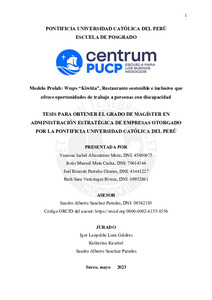Modelo prolab: Wraps “Kiwiña”, restaurante sostenible e inclusivo que ofrece oportunidades de trabajo a personas con discapacidad
Date
2023-12-01Author
Altamirano Meza, Vanessa Isabel
Mata Cacha, Jesús Manuel
Parreño Chumo, Joel Ricardo
Verástegui Rivera, Ruth Sara
Metadata
Show full item recordAbstract
El proyecto de tesis busca resolver la falta de empleabilidad en personas con
discapacidad en Perú. Se estimó que en el año 2022 existían 1,737,865 personas con
discapacidad, representando el 5.2% de la población y sólo 45 de cada 100 personas con
discapacidad formaban parte de la PEA (INEI, 2017).
Para aportar a la oferta de empleo se propone implementar food stand que ofrezca
wraps a base de tortillas de maiz rellenas de platos criollos como producto principal. El wrap
es un tipo de comida que consiste en un relleno envuelto en una tortilla flexible, de harina de
maíz. El relleno en esta ocasión será a base de platos peruanos criollos que fueron
seleccionados luego de realizar encuestas de preferencia en nuestro target. Asimismo,
elegimos el nombre “Kiwiña” ya que su significado en el lenguaje aymara es enrollar y
llamar con gestos, que consideramos encajaba con la forma de comunicación no verbal que
queremos transmitir.
El negocio busca ser rentable, escalable y sostenible a través de la producción y
comercialización de wraps en canales físicos y digitales. Se planea tener una planta de
producción para optimizar el proceso productivo y trasladar posteriormente los productos
semiterminados a los food stands para su comercialización. En ambos procesos participaran
personas con discapacidad, quienes serán evaluados de acuerdo a sus capacidades
(sensoriales, físicas, e intelectuales) para que ocupen diversos puestos. Se espera que el 50%
del personal esté compuesto por personas con discapacidad quienes ingresarán a planilla con
los beneficios sociales.
La escalabilidad es importante en el modelo de negocio, con la meta de establecer
múltiples food stands en los principales Centros Comerciales de Perú en los primeros 5 años.
Se proyecta alcanzar un VAN de S/3 ́821,713.97 y un TIR de 94.64% al final del quinto año.
Finalmente, se espera que esta idea sea un referente en la aplicación del modelo de gestión de personas con discapacidad en empresas del sector de restaurantes y hoteles, contribuyendo así
a la independencia económica de dicha población. The thesis project seeks to solve the lack of employability in people with disabilities in Peru.
It was estimated that in the year 2022 there were 1,737,865 people with disabilities,
representing 5.2% of the population and only 45 out of every 100 people with disabilities
were part of the EAP (INEI, 2017).
To contribute to the employment creation, it is proposed to implement a food stand that offers
wraps based on corn tortillas filled with Creole dishes as the main product. The wrap is a type
of food that consists of a filling wrapped in a flexible cornmeal tortilla. The filling on this
occasion will be based on Creole Peruvian dishes that were selected after conducting
preference surveys in our target. Likewise, we chose the name "Kiwiña" since its meaning in
the Aymara language is to roll up and call with gestures, which we considered fit with the
form of non-verbal communication that we want to transmit.
The business seeks to be profitable, scalable and sustainable through the production and
marketing of wraps in physical and digital channels. It is planned to have a production plant
to optimize the production process and subsequently transfer the semi-finished products to
the food stands for marketing. In both processes, people with disabilities will participate, who
will be evaluated according to their capacities (sensory, physical, and intellectual) to occupy
various positions. It is expected that 50% of the staff will be made up of people with
disabilities who will enter the payroll with social benefits.
Scalability is important in the business model, with the goal of establishing multiple food
stands in the main Shopping Centers in Peru in the first 5 years. It is projected to reach a
VAN of S/3'821,713.97 and an IRR of 94.64% at the end of the fifth year. Finally, this idea is expected to be a benchmark in the application of the management model for people with
disabilities in companies in the restaurant and hotel sector, thus contributing to the economic
independence of said population.
Temas
Personal con discapacidad--Empleo
Restaurantes--Perú
Sostenibilidad empresarial
Restaurantes--Perú
Sostenibilidad empresarial
Para optar el título de
Maestro en Administración Estratégica de Empresas
Collections
The following license files are associated with this item:






